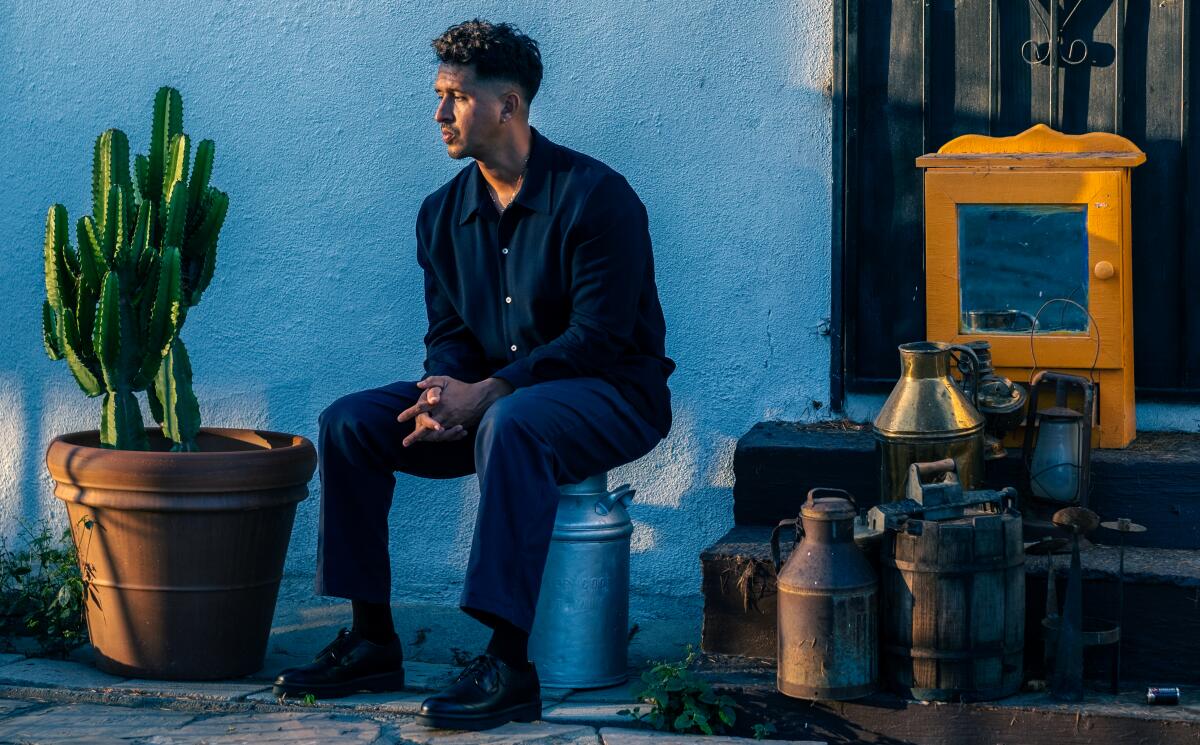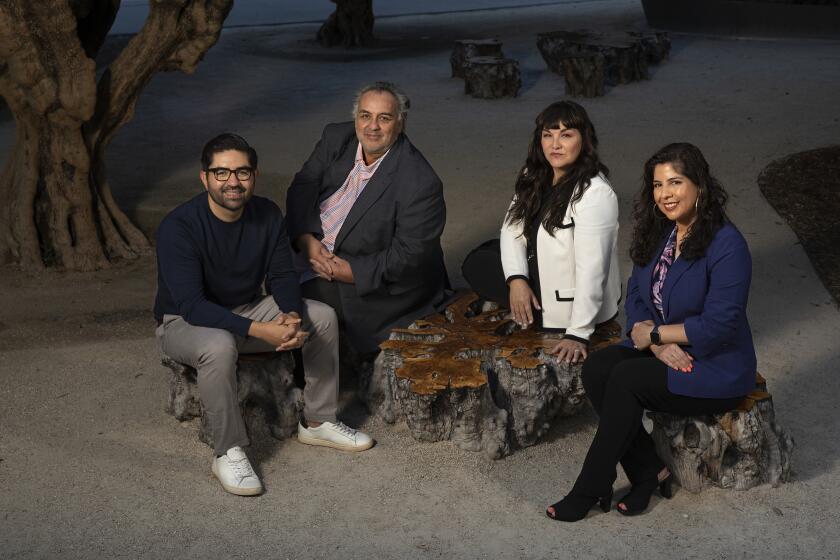Using Los Angeles as a canvas, Walter Thompson-Hernández remaps narrative art

- Share via
Walter Thompson-Hernández — whose fictional short film “If I Go Will They Miss Me,” set at the Imperial Courts housing project in Watts, won a Sundance award earlier this year — knows he needs to update his personal website. The earnest SEO copy the writer-director crafted a few years ago still describes him as a “multimedia journalist, exploring the world, asking what it means to belong.” It’s an artifact of his days covering culture for the New York Times, a job that took him to Rio de Janeiro, Japan, the Dominican Republic and Oaxaca, Mexico.
“I’m like, wow, that was the lane that I was in, and now it’s almost a completely different lane,” the El Sereno-based writer-director, 37, said in a recent interview with The Times, which previously covered his 2020 book on the Compton Cowboys. Thompson-Hernández’s old lane focused a lot on identities: his own and many others. In a 2015 essay for BuzzFeed, he wrote, “I first learned I was a Blaxican from a DJ on Power 106 FM, a Los Angeles hip-hop station. ... It changed the way I, the son of an African-American man from Oakland and a first-generation American from Jalisco, Mexico, self-identified forever.”
Although he’s still figuring out his place in the world, Thompson-Hernández has evolved. His trajectory from journalist to artist has given him the tools of realism that he uses to craft stories about the soul, often with L.A. as the backdrop. With five visual projects and a book currently in development, Thompson-Hernández is both here and seemingly everywhere, remapping the boundaries of narrative storytelling. This interview has been edited for brevity and clarity.
Our inaugural LA Vanguardia class is an amazing array of Latino talent shaping the movies, TV, music, fine arts and literary scene of today — and tomorrow.
You have done magazine journalism; you’ve written and directed a “visual poem” about the mass shooting in Uvalde, Texas; you’ve directed short-form cinema; you’ve done an ad for Dr. Dre for the Super Bowl. How do you think about medium?
One of my biggest fears in life is to be boxed in in some way that doesn’t allow me to grow and evolve as a person and a storyteller. It sort of starts with journalism, and then I go to grad school, and then I’m with the New York Times doing multimedia things there. I’m writing, directing, taking photographs and posting, and then that sort of evolves into book writing and then podcasting and now filmmaking. I see it more as an evolution. Filmmaking is the most exciting medium because it embodies all of these different practices.
You first grew up in Huntington Park in southeast L.A. County, and after the L.A. riots in ’92 your mom moved you to the Westside when you were 7. How did that affect how you view L.A.?
Growing up in Huntington Park, I was surrounded by almost nothing but Mexicans, Mexican Americans. I felt very protected and safe in a home filled with cousins, aunts and uncles. But the Westside was incredibly lonely. My mom was getting her PhD at UCLA at the time, and so it was just us navigating an incredibly new, diverse world we had no practice in. For a lot of people, L.A. can be intimidating. It’s a very expansive, sprawling city. But I started thinking about L.A. as a larger sort of canvas, and I’ve been really lucky to be able to live in different parts of the city.
How did you get the idea for your new film, “If I Go Will They Miss Me”?
The film kind of starts when I’m 5 or 6 [years old], and when I’m looking up at the airplanes above our home, and when I’m dreaming about where these airplanes are coming from, where the people are going, the larger meaning. Then it really crystallizes when the Delta jet fuel dump happens [20 schoolchildren in Cudahy were drenched by jet fuel from a plane leaving LAX]. I had already been thinking about transitioning into filmmaking, and I thought that this was a really interesting time to make that transition. The film is a collection of personal anecdotes rooted in a narrative story about a father who wants to support his son.
How much of that is fiction versus what you draw from reality or your own experiences?
It’s both. The genre I really love to work with is docu-narrative, creating narrative worlds based on the experiences of real people. I love to engage with first-time actors. There’s something so raw and interesting and authentic about the way that they play fictionalized versions of lives they already lead. This comes from my experience as a journalist. My best directing on any type of set today happens when I’m doing the least amount of directing.
In his new book, “The Compton Cowboys,” Walter Thompson-Hernández explores the little-known history of black cowboys in Los Angeles County.
Who are your big cinematic or visual influences?
I’ve always loved the work of Charles Burnett. “Killer of Sheep,” how he creates a world within and around Watts by using first-time actors and creating a very loose narrative. The way Terrence Malick captures interiority through voice-over, and the way he captures a larger philosophical meaning, it’s almost like we’re not even watching the film, we’re engaging in a very beautiful philosophical class. I also love [Abbas] Kiarostami, the Iranian director; [Akira] Kurosawa — I just love the way he captures nature.
Malick’s work evokes transcendence. Is there any religious influence on your work?
I’ve lost a lot of people in the past two and a half years, almost 18 people, mostly COVID — aunts, uncles, cousins, friends. I’ve really had to think about the role of spirituality and God in all that we do. A lot of that is coming out in the work I’m doing. In “If I Go Will They Miss Me,” there’s a lot of references to God, protection and community. The father in that film is asking God to look after his child. In a way that I think Terrence Malick is maybe searching for transcendence in his films, I’m really searching for spirit and community in the work I’m doing.
Do you see your work as helping provide some comfort or recognition for people who are having these experiences too?
I’d be lying to you if I told you that I’m thinking about the next person, because I think that the art I’m trying to make is a hyper-specific art. We fail as artists when we try to reach everyone, because then we actually reach no one.
I’m thinking of that old Diane Arbus quote: “The more specific you are, the more general it’ll be.”
Totally. And it’s interesting, right, because we’re not brought up that way. Particularly people who work in storytelling, it’s almost like, you know, we were lied to, essentially. We were told that the art we make, the things we create, were supposed to be for everyone, right? Now we’re finding that the more hyper-specific we get with our art, the more general and popular it becomes. I’m finding that with a lot of things that I’ve been doing over the years, like the story of the Compton Cowboys.
A Hollywood talent manager, curator, playwright and scholar talk about how Latinx artists are approaching representation with greater nuance.
What do you do for fun?
I go to the beach a little south of Dockweiler, and I just walk there by myself and listen to Elvis Mitchell or, like, Terry Gross for an hour. I’m also getting older, so to me, there’s nothing better than an evening walk. It’s almost become like a sacred physical act.
More to Read
The biggest entertainment stories
Get our big stories about Hollywood, film, television, music, arts, culture and more right in your inbox as soon as they publish.
You may occasionally receive promotional content from the Los Angeles Times.













